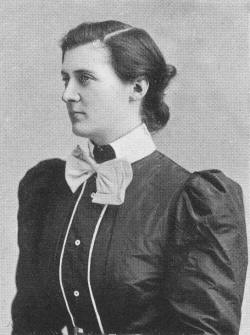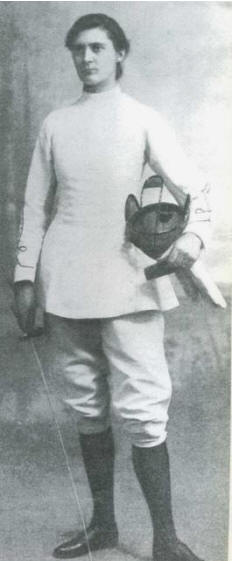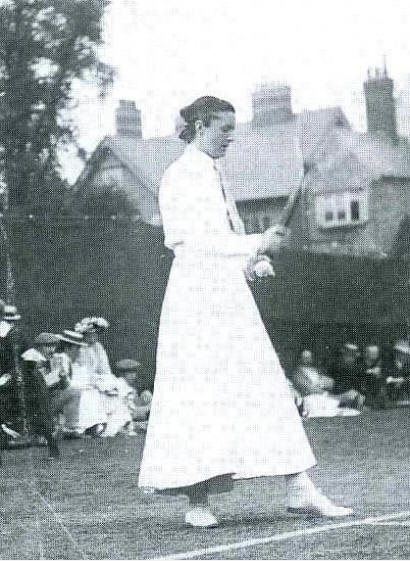

Partner Fabienne Lafargue d'Avilla
Queer Places:
Les Ruches in Avon, Seine-et-Marne
Lowther
Lodge, Mare Hill Rd, Pulborough RH20 2DY, UK
 May "Toupie" Lowther (also Toupée; 15 April 1874 – 30 December 1944) was an English tennis player and fencer, active during the late 19th century and early 20th century. During the First World War, she led an all-female English unit of ambulance drivers assisting the French Army and was awarded the Croix de Guerre.
May "Toupie" Lowther (also Toupée; 15 April 1874 – 30 December 1944) was an English tennis player and fencer, active during the late 19th century and early 20th century. During the First World War, she led an all-female English unit of ambulance drivers assisting the French Army and was awarded the Croix de Guerre.
Lowther was born in London, the daughter of Francis William Lowther, born in Italy, and Louise Beatrice de Fonblanque, born in Montreal. She was the sister of Claude Lowther, MP for Lonsdale. Francis William was the illegitimate son of the William Lowther, 2nd Earl of Lonsdale and Emilia Cresotti, an Italian opera singer.[1] Francis William first cousin was Verena Maud Lowther. Her maternal grandfather was the historian Edward Barrington de Fonblanque. Two years before Toupie's birth, the Earl of Lonsdale died and left her father a healthy inheritance of £125,000. She was educated in France at the boarding school Les Ruches in Avon, Seine-et-Marne and received a bachelor's of science from the Sorbonne.[2]
Lowther was a gifted athlete. The Times described her as "a brilliant fencer and sportswoman, who could hold her own in anything that required skill and brains."[2] She was well known as an amateur player in championship women's tennis, and during the tennis season was a regular participant in the British tournaments at Edgbaston, Beckenham, Manchester and Wimbledon as well as on the traditional European circuit. In particular she played frequently at the German Ladies Championships (held at the prestigious Bad Homburg Tennis Club) from 1896–1901 and then in Hamburg (the Eisbahn-Verein auf der Uhlenhorst).[3] In 1898, at Bad Homburg she lost to compatriot Elsie Lane 5–7, 5–7 after a "brilliant, albeit erratic, Toupie Lowther who had abandoned her usual play in favour of an uninspired game from base line in two straight sets."[4] In 1899 she lost a close match in an early round to Charlotte "Chatty" Cooper, (later Mrs Sterry). After leading 5–1 in the second set Toupie lost six games in a row.[5] However Toupie was finally victorious at Bad Homburg in 1901 defeating Gladys Duddell in the final 6–0, 6–0, a victory described as the result of "patience and perseverance".[6] Lowther won the singles event at the British Covered Court Championships in 1900, 1902 and 1903.[7][8] In 1901 she won the singles title at the German Championships, held that year in Bad Homburg, and received her prize, a gold brooch, from King Edward.[9] Between 1900 and 1907 she made five appearances at the Wimbledon Championships, playing in the singles event. Her best result was reaching the semifinals in 1903, losing in straight sets to eventual champion Dorothea Douglass Lambert Chambers, as well as in 1906, this time losing in three sets to Charlotte Cooper Sterry.[10] She was described with affection by the tennis writers of the time. The brothers Reginald and Laurence Doherty invited her to write a chapter entitled Ladies' Play for their book Lawn Tennis published in 1903 and George Hillyard, the All England Tennis Club Secretary for many years and husband to Blanche Hillyard in his book Forty Years of First Class Tennis (1924) was glowing in his appreciation: "Here is the extraordinary case of a player whose potentialities were greater than any other English lady who ever walked onto a court, but who, unfortunately was saddled with a temperament which was so hopelessly unsuitable to lawn tennis that it reduced her play.... not one, but at least 2 classes below what her form should have been... It is no flight of imagination to say that had Miss Lowther been blessed with the temperament of a Mrs Sterry or a Mrs Lambert Chambers, she might have been as fine a player as Mlle Lenglen herself."[11][a] Lowther was also an outstanding fencer, a keen motorist, weightlifter and practitioner of jujitsu.[3] In a fencing article in the July 1899 issue of Harmsworth Magazine she is described as "Perhaps the most clever among the younger generation of lady fencers...., who may justly be termed the champion swordswoman of the kingdom."[13] An article in The Herald in 1901 mentions her as the lady fencing champion of England.[14]


During World War I, frustrated with the lack of opportunities the British Army offered women during the war, she organised with Norah Desmond Hackett an all-female team of ambulance drivers, the Hackett-Lowther Ambulance Unit in France.[2] The unit consisted of 20 cars and 25 to 30 women drivers and operated close to the front lines of battles in Compiègne, France and was attached to the 2nd Army Corps of the French Third Army.[16] She was awarded the Croix de guerre in July 1918.[2][17][18] Additionally she was the London president of the Relief for Belgian prisoners in Germany committee.[19][20][21] She returned to London in August 1919 after two-and-a-half years in France.[2] Toupie was a friend of Mabel Batten (Ladye) and Radclyffe Hall and is frequently mentioned in Mabel's diaries, 1910-5. After Mabel's death, Radclyffe Hall and Mabel's cousin Una Toubridge became a couple. Again Toupie and her brother Claude were friends of Radclyffe Hall and Una, who were taken with Toupie's war record. In 1920, Una said that she thought that Toupie was a hermaphrodite. In 1922 in Brighton with Una Toubridge and Radclyffe Hall she bought an “Overland Tourer” and taught them to drive. Romaine Brooks referred to her as 'Brother'.
Also in 1926, Radclyffe Hall wrote a short story, "Miss Ogilvy Finds Herself", although it was not published until 1934. It drew on Toupie's accounts of her life during the war, her masculinity and her lack of fit in society. Ogilvy, "My God! If only I were a man", who, even as a child had insisted that "her real name was William and not Wilhelmina", finds a role in the war leading an ambulance unit, but afterwards finds that again her masculinity has become absurd. She commits suicide. A few years later Radclyffe Hall incorporated much more of Toupie into the life of her FTM invert anti-hero Stephen Gordon, who is an accomplished fencer, tennis player and motorist, in the ambulance unit in the battles at Compiègne, and is awarded a Croix de Guerre. The book was published in 1928 as The Well of Loneliness. It was prosecuted for obscenity that same year. This had a side effect of outing the Hackett-Lowther Unit as being largely a lesbian organization. For a while after the trial, Toupie took to dressing as an heterosexual woman: skirts, silks etc, and disassociated herself from Hall and Troubridge. Toupie's brother, Claude, unmarried, but the father of one son, after a career as a right-wing Conservative, died the next year after a period of illness – the outing of his sister cannot have helped.
Toupie spoke of being the inspiration for Stephen Gordon and some books say that John and Una dropped her for saying so. Una wrote in her life of Radclyffe Hall: “She passed out of our lives when John wrote The Well of Loneliness, and we afterwards heard that she had resented the book as challenging her claim to be the only invert in existence. Later still, when she was growing very old, I was told that she had moreover acquired the illusion that she had served as a model for Stephen Gordon.”
She was an accomplished singer and composer. She set poems by Oscar Wilde and Alfred Tennyson to music, and her music was performed at the Wigmore Hall in London. The Waifs and Strays Society held a fancy Grand Benefit on 3 June 1899 with royalty in attendance. The program included "Incidental music by Miss Toupie Lowther".
She was one of the first women to own a motorbike and lift weights. In the 1920s Toupie ran a lesbian salon, and writers such as Radclyffe Hall, Ida Wylie, May Sinclair and Vere Hutchinson attended. Toupie loved to tell how, while motoring, she was stopped at the Franco-Italian border for masquerading as a man. On the return journey she wore a skirt and was arrested for masquerading as a woman. She crossed the alps on a motorbike with her god-daughter Fabienne Lafargue d'Avilla riding pillion.[15]
In 1935, Toupie's elder sister Aimée, an unmarried amateur thespian, died of tuberculosis. Toupie retired to the village of Pulborough, Sussex. During the war years, a little girl needed a field in which to keep her shetland pony, and a vacant field was known to be available: "The little girl made her way up the hill to Lowther Lodge, and knocked on the door. Which was opened by an elderly gentleman with short grey hair wearing a suit. Rather surprised Joanne asked if Miss Lowther was in. 'I am Miss Lowther' said the elderly gentleman 'come in'. Toupie died in 1944, like her sister, of tuberculosis. Fabienne Lafargue d'Avilla, who was present at the time of her death, was the main beneficiary of her will.
Toupie Lowther is depicted as a member of a secret society of bodyguards protecting the leaders of the radical suffragettes in the graphic novel trilogy Suffrajitsu: Mrs. Pankhurst's Amazons (2015).
My published books: